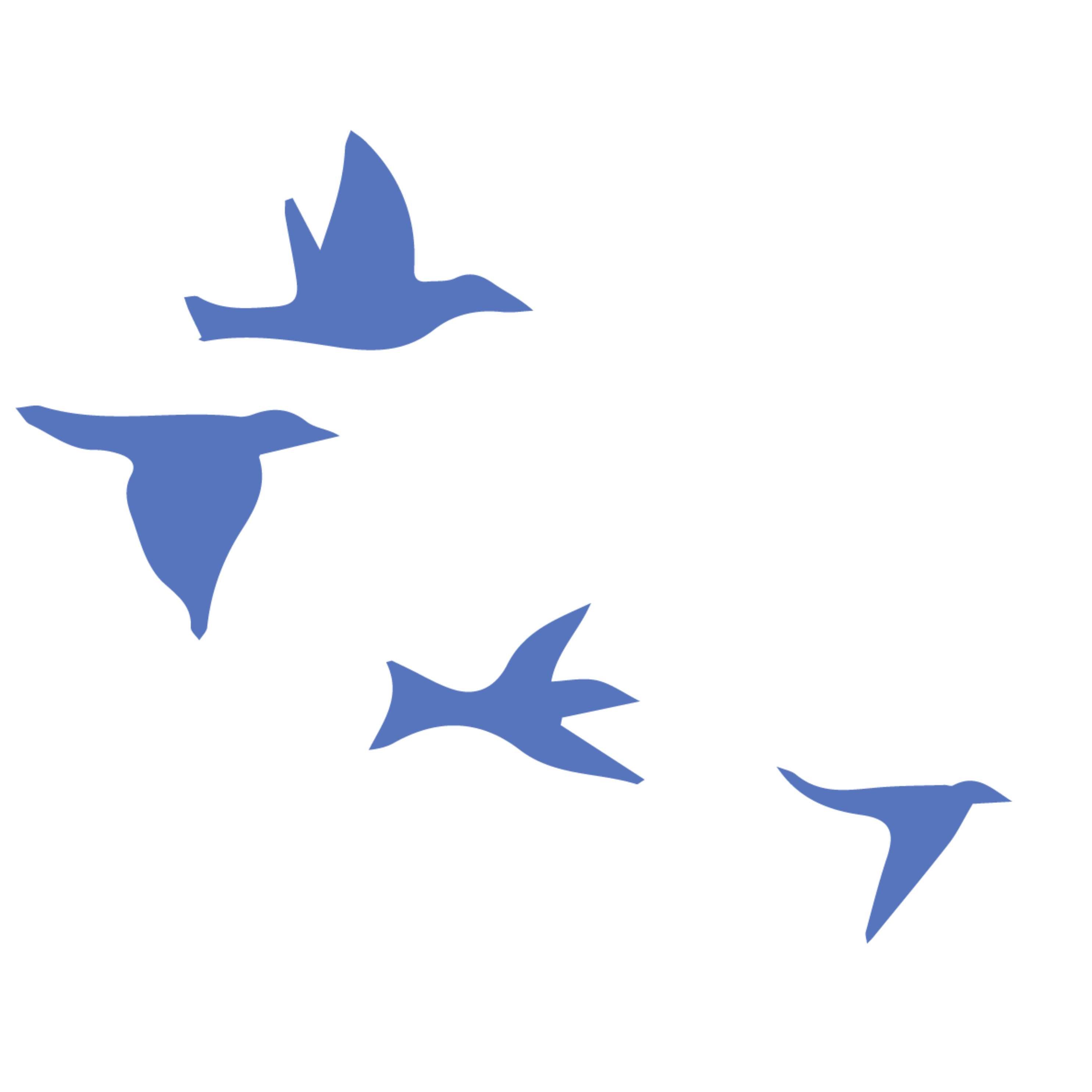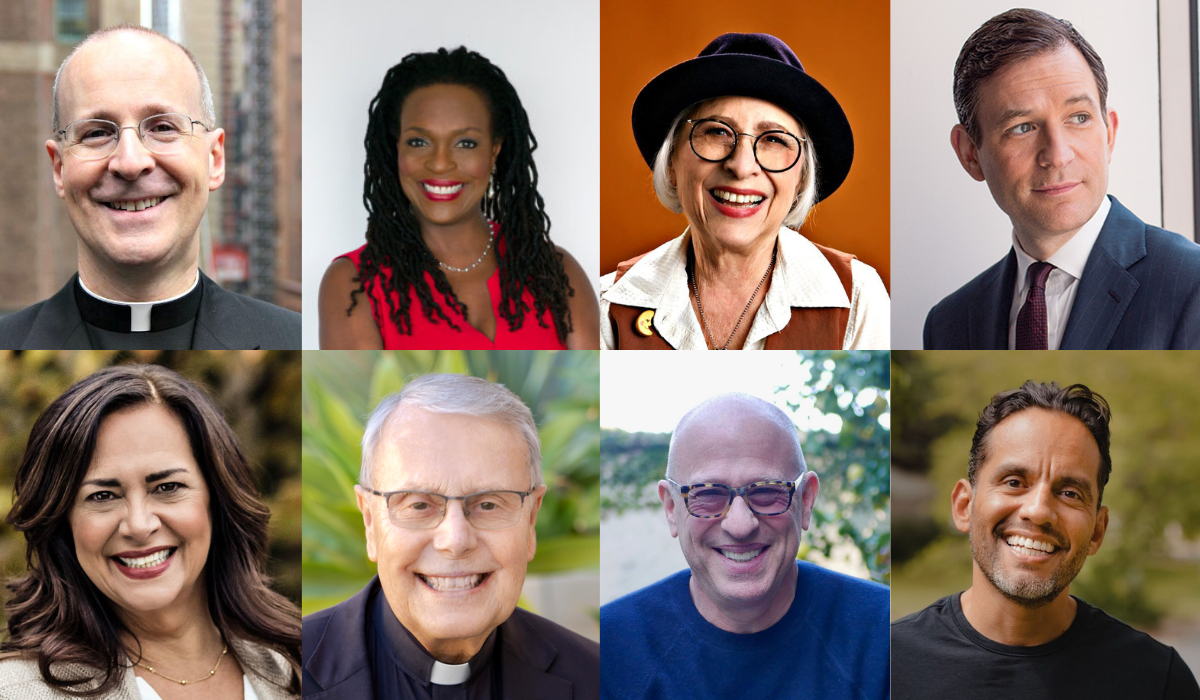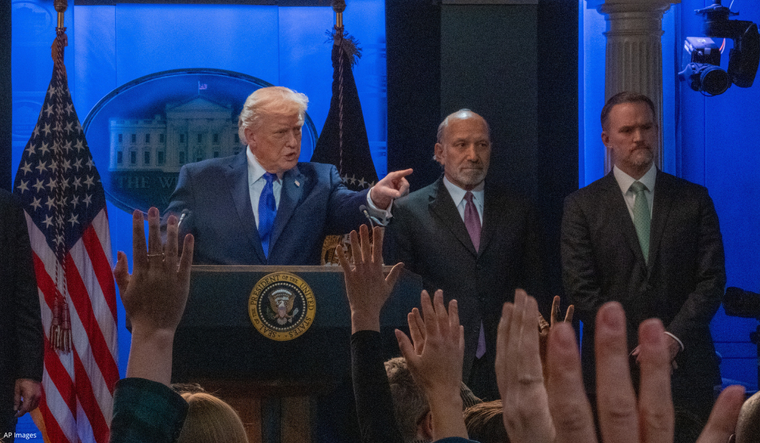A Guide to Living in the Unknown

It’s impossible to describe the times we are all living in right now. Every meeting we have at The Sunday Paper touches on the constant flurry of headlines and global events, and the universe of emotions they trigger. We are all facing the unknown, and many of us are struggling with uncertainty.
These can be difficult truths to face. In this light, we sought the counsel of eight revered spiritual leaders, writers, and visionary thinkers. We asked them: How can we find our ground in the face of such uncertainty? Their insight and practices—which you'll find below—offer soulful light.
Varied in approach yet unifying in sentiment, their answers reveal that while the unknown may be daunting, it is also a reminder to look within, draw on your wisdom, and see the beauty and love in this world that never fades.
Dan Harris, host of the podcast 10% Happier with Dan Harris and author of a new Substack
One of the massive and massively inconvenient design flaws in the human animal is that we live in a world of ceaseless change—non-negotiable impermanence—and we hate uncertainty, which leaves us pretty anxious.
One of the little moves that I make a lot when I'm experiencing mid-level stress or anxiety, or even high-level stress or full-on panic, is self talk. There’s research on a type of self talk called “distant self talk.” Ethan Cross at the University of Michigan has pioneered this work. Distant self talk involves addressing yourself using your own name, so it provides some psychological distance. So I'll say, “Dan, all you can do is everything you can do. And if it doesn’t work out, you'll figure it out.”
I also love an exercise I learned from Kristen Neff, the pioneer of the research into self compassion. She talks about self compassionate touch, which for me means putting my hand on my chest, which is where most of my emotions register if I'm paying attention, and then talking to myself the way I would talk to a good friend. We're really good at giving advice to friends, children, mentees—and we can channel that toward ourselves, too. These are ways I navigate uncertainty.
James Martin, SJ, author of Come Forth and host of “The Spiritual Life” podcast
One of the easiest (and best) ways to find your way through tough times is with what we Jesuits call “discernment.” Basically, it invites you to see where God’s “voice”—not really hearing it aurally, but within you and from friends and in the world—is calling you. It also means being attentive to the ways that other “voices” (again, we can think here of impulses and attractions) draw us away from God. And in tough times, this is often the voice of hope versus the voice of despair.
Sometimes of course, in the face of overwhelming bad news, despair can seem like the most reasonable response! But it's never coming from God, because it's always a dead end. Despair says, “I know nothing can ever get better.” Or, worse, it says, “I know that God can’t change any of this.” Hope, on the other hand, knows that God can always help us, support us, be with us, and move the world towards change.
So if you're looking for an easy way to discern, here it is: Despair is never coming from God. Hope always is.
Rabbi Steve Leder, author and Senior Rabbi of Wilshire Boulevard Temple in Los Angeles
When someone spews hate, disrespects my faith or my most cherished values, I lash out sometimes. These moments of anger are born of fear, clothed in the rhetoric of a social media post, DM, private conversation, or screaming out loud at the TV. Mostly, I feel awful about it later. Even rabbis have “triggers;” the definitional precursor to an explosion.
When fear starts me spinning, I seek to remember what the ancient prophets would say to us today about our national bickering. They would remind us that the Second Temple in Jerusalem fell not because of Roman occupation but because of sinat chinam—infighting. They would point out the plague of darkness in the Passover tale was “A darkness so dark that people could not recognize the humanity in each other.” The prophet Zecharia would shout to us across the generations, “Not by might and not by power, but by God’s spirit shall people live in peace.”
What is real peace? The great Slonimer Rebbe explained it this way: “The shalom that our Rabbis placed on such a high spiritual level cannot simply mean the absence of disagreement and conflict.” His point is that real peace is so much more than the lack of differences. Real peace is an ethic, marriage, family, workplace, city, nation, and world that honors different points of view and different human journeys.
The Talmud is the collection of laws that have defined the essence of Judaism for 2,000 years. Choose any one of its 2,711 pages and you will see multiple opinions of different schools of scholars and individuals. Every argument is recorded, considered, and respected. This was the ancient rabbis’ model for us to prosper—by appreciating and respecting each other’s views, not by demonizing them.
We all fall short of ideal peace sometimes, but that should never be an excuse to stop trying.
Msgr. Lloyd Torgerson, Pastor at Saint Monica’s Catholic Church in Santa Monica
I just returned from Africa, and once again, I am not the same.
There is something about being 10,000 miles away that forces a kind of clarity. It reminds you—viscerally—that the world is far bigger than your corner of it. And that healing rarely comes from thinking harder. It comes from showing up, from doing good for others, even when you don’t fully understand their story—or your own.
The people we met have so little, and they gave so much. The simplicity of their lives, the way they cling to the fundamentals—kindness, faith, time together—was humbling. We as so-called ‘developed countries’—a label based on economics, not on wisdom, education, or hospitality—often can’t touch the larger questions, but our brothers and sisters in Dandora live them daily. They trust in the present moment because it's all they have.
I’ve traveled to our sister community in Nairobi many times now. And still, every trip strips away a layer. I come home with fewer answers, yes—but also with more hope. I’m reminded that being vulnerable doesn’t make you weak. It makes you honest. It’s how you recognize Christ in others—and in yourself.
Dandora doesn’t wallow in its brokenness. It lives through it. It keeps loving anyway. And that’s what I want to do: to let love be the remedy. Not the answer, not the solution, but the thing that keeps us getting up, going out, and making whatever difference we can, wherever we are.
Because sitting at home saying “woe is me” doesn’t change the world. But loving someone else just might.
Carol Orsborn, PhD, author of Spiritual Aging (and numerous other titles) and internationally-recognized thought leader
After a lifetime devoted to life mastery, what a shock to discover that we have been set adrift in a sea of chaos. Many of us are feeling powerless and out of control. This is a world that needs its wise elders more than ever, but how can we step up to the challenges posed by our times when we are reactive, defensive and driven by fear?
As it turns out, those of us who have or adopt spiritual practices tend to fare better than others. Rather than experiencing this as a time of dissolution, it is possible to see it as an accelerated period of spiritual growth. In fact, it is times such as these that we have been practicing for.
These five spiritual practices—ones with which you are undoubtedly familiar—can be put to use on your and the world’s behalf, helping you to be as clear-headed and grounded regardless of what is swirling around you.
1. Humility. There is nothing more humbling than realizing that not only is the world not what you thought it was, but that you aren’t who you thought you used to be, either. But the flip side of this is gaining a better grasp of reality. Under the best of circumstances, as we grow older, the normal losses, disruptions, and challenges of aging bring us face-to-face with the fact that we have never been as in control as we believed ourselves to be. Aging in our fraught times accelerates the pace even more. We see more and see deeper. Denial shatters our illusions, and we are forced to rebuild often from scratch. But when we do, we will be at last building on the solid ground of acknowledging reality for what it is.
2. Authenticity. Breaking denial also means you feel more. Accept that you are sad or afraid, you are still sad or afraid. Spirituality is not a free pass to genuine and often understandable responses. True spirituality is less concerned with our being happy, and comes more in service of making us whole. When you feel your life crumbling beneath your feet—including the loss of comforting if outgrown illusions—it is natural to mourn. Take your time before trying to suppress or solve the pain. Take the time you need to be kind to yourself.
3. Awakening. When you lose the storyline that once gave meaning to your life, understand that this is an integral part of your spiritual journey. When we question our basic premises and feel lost, confused, and alone, that is when we bust through the limited status quo that once prescribed the parameters of our lives. While you may have preferred a less painful initiation, this is what the mystics are alluding to when they talk about awakening.
4. An Expanded Consciousness. Sometimes it’s gradual, sometimes it’s sudden, but sooner or later you realize that you are thinking more clearly and making decisions more wisely. Over time, you regain the narrative of your life and you are grateful for having had the opportunity to rise to the occasion life has presented you with.
5. Faith. Uncertain times test our faith. When things are out of control, that’s the time to ask yourself what Albert Einstein posited to be the most important question every human must ask themselves: “Is this a friendly universe—or not?” This question requires a leap of faith because objective facts and rational processes rarely justify the conclusion that things will work out in the end. And so we circle back to the beginning: humility. Not necessarily as you would have preferred it, not on your timeline, perhaps not even in your lifetime, but never fear: You can come to walk hand in hand through the darkest nights knowing that you are beloved unconditionally and that the answer to Einstein’s question despite appearances is “yes.”
Danny Morel, global life coach and spiritual leader
There are two versions of ourselves we can live from: the Societal Self and the Spiritual Self.
The Societal Self is deeply connected to the happenings of society. On an energetic level, their emotions, mental state, and overall being are constantly being pulled in many different directions, and always will be. It will be because this is the role of the third world—to keep us separate from ourselves, our nature, and essence.
The Spiritual Self transcends any negativity that's happening in the world because, on an energetic level, they realize the world is simply a reflection of themselves. What they see, feel, and are moved by is simply a projection of the inner turmoil, or lack thereof, within.
If you're having a hard time with what you're seeing in life right now, ask yourself: What is this trying to show me about myself, my focus, and my innermost connection to the frequency of peace? Then, leave your phone at home and go for a walk with yourself in nature. Close your eyes for 10 minutes. When you open them, something miraculous would have happened. Everything you fear or are unhappy with about the current state of the world will be gone.
Because that's what happens when we disconnect from the outside and re-connect to the inside: We disconnect from our Societal Self and reconnect to our Spiritual Self. And with it, we find that the peace we've been looking for "out there” was “in here” all along.
Kathy Caprino, author and host of the podcast “Finding Brave with Kathy Caprino”
It can be so powerful and helpful to consciously align our energy with what we want to experience. It is easy to forget that we’re not here just to do — we’re here to feel, to create, and to tune in. The more I pause to notice how I’m feeling — and how those feelings are shaping what I attract and experience — the more empowered, calm and grounded I become, no matter what I am facing.
Right now, I’m focusing less on “pushing forward” and more on “tuning in” —choosing clarity, peace, joy, and flow as my compass. I trust that from that aligned space, the next right steps will always become clear.
However you are feeling, here's a short grounding practice to help you realign and reconnect with yourself whenever you need it.
1. First, take a few quiet moments with yourself to find stillness. Sit comfortably, with both feet on the floor or feel the ground beneath you. Let your hands rest softly in your lap.
2. Close your eyes. Take three slow, deep breaths—in through your nose, out through your mouth. Let each exhale release a little tension from your body.
3. Bring your awareness to this moment. Notice what you hear, what you feel in your body, and the rise and fall of your breath. There’s nothing to fix. Nothing to do. Just be.
4. Now, gently ask yourself: What do I most want to feel? What energy do I want to bring into my life, my work, my relationships?
5. Feel it now. Let yourself imagine — even for a few seconds — that you're already in that experience. Safe. Connected. Aligned. Let that feeling wash through you like a soft current.
6. When you're ready, open your eyes. Carry even a drop of that energy with you into the rest of your day.
Reverend Jacqueline Lewis, Senior Minister in the Collegiate Church in New York City and author of Fierce Love
Like you, I am deeply concerned about the state of our nation and the state of our world. What keeps me going, what centers me, is this sense that something is being born. It is a decision to believe this. Yes, I also believe that there is something dying. Systems of oppression are dying, and baring their teeth, thrashing about, gripping us with terror because they do not want to die. They are fighting to stay alive; they are willing to kill to stay alive.
But we are also having labor pangs. Something is being born. We are experiencing intense contractions in the womb that is the world. There is pressure, and pain as the new life, the new way of living, becomes ready to be born. It hurts and is frightening. It is terrifying, and on occasion, we might even wonder if this birthing will kill us.
It is as though we are standing in a liminal space between life and death.
I’ve never given birth, but I feel this sense of pregnancy as real, as true. Something is being born in the world, born in us. Something tender, more loving, kinder. Something new—or maybe old—about connectivity and belonging—a way to be that we remember from a long-ago time: We will only thrive together. This new way of living contradicts the state of the world, and I am convinced that one day, to quote a songwriter, when the glorious comes, it will be ours. And when we stand in that new world, we might look back and think the suffering had a purpose; that it was pushing and shoving the new thing from the darkness into the light.
Something is being born, and I wonder if we can feel the energy of a midwife. What can I do, what can we do to coax the new thing out, to help it come, to encourage “what is about to be revealed” to show itself? We can build relationships with bonds as close as family. We can create a chosen family to keep watch, and to comfort each other as though putting ice chips in the mouth or a hand on the back. We can decide that our anticipation is active, not passive, joining into local politics or protests. Making calls, asking questions, sharing wisdom, building coalitions.
For some of us, our protests will happen with pens or computers. We can articulate the vision of a healed and whole world, the vision for which many of us wait, to our children, in our workspaces, in the wild place of social media. We can name the new thing, while it is yet on the way, like we might name a child before we meet them.
We can call the new thing forth with our prayers and our creativity. We can choose to see the suffering, to name the suffering, as signs of new life, as proof of life. And in the meantime, we can breathe deeply, anticipate hopefully, and be mindful of what the pain is teaching us—about us, about the world we want.
Please note that we may receive affiliate commissions from the sales of linked products.



